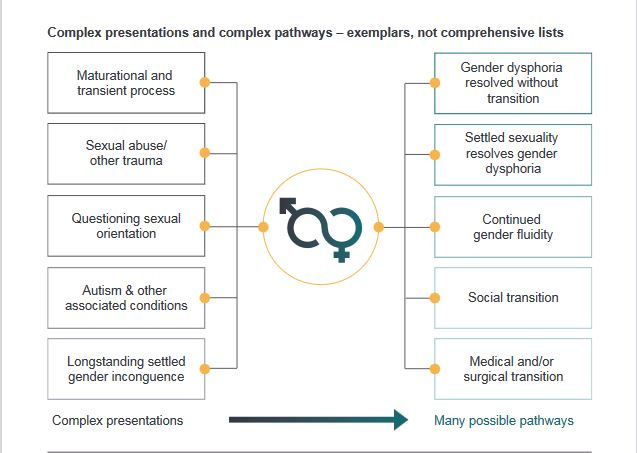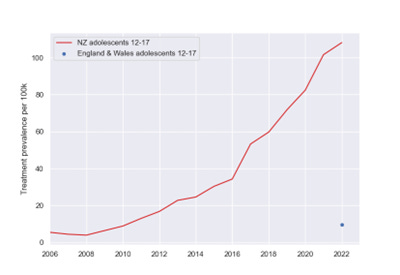Genspect New Zealand welcomes the Final Report by Dr Hilary Cass following the closure of the UK Tavistock Gender Identity Clinic by the NHS
New Zealand Health Services have much to learn from the Final Report of the Independent Review of Gender Identity Services for children and young people being released today. The review was chaired by Dr Hilary Cass, a former President of the Royal College of Paediatrics and Child Health (2012-2015), and an honorary Consultant Paediatrician.
Genspect’s New Zealand spokesperson Jan Rivers said
“We welcome the final report by Dr Cass on the future of gender medicine for children and young people in England.”
“The final Cass report moves England decisively away from one-size fits all gender medicine production line to psychosocial approaches that address the actual reasons for distress. It is high time the New Zealand Medical system took note and recognised the considerable harm it has done to New Zealand’s children and young people.”
“Children and young people cannot consent to life-changing decisions about medical drugs and procedures that radically limit the future capacity of their developing bodies. Our stance is informed by awareness of the poor quality evidence-base supporting social and medical transition.”
The CASS final report was released today 10 April at 11.00 am NZ time.
Evidence reviews supporting the CASS report
Background
The 2022 Cass Interim Report examined the treatment of children at the Tavistock Gender Identity Clinic; the report led to closure of the clinic and an end to prescribing of puberty blockers for children in England unless, and until, there is a clinical trial. The Interim Report suggested ‘open discussion’ was necessary. The Cass Interim Report also identified that there are many causes that may lead to the development of distress over an individual’s sexed body. Equally, there are just as many routes out of such distress that do not involve medical transition.
Figure 1 Cass Interim report: Complex presentations and pathways
The final report addresses the grave psychological harm caused by ‘social transition’ Research has consistently shown that the majority of children who present with gender dissatisfaction move on from this as they grow beyond their early teens and develop further. In contrast social transition reinforces the child’s transgender ideation, leading them towards potentially lifelong medical intervention.
The Report draws attention to a ‘schools to clinic pipeline’ when gender identities are presented as a possible option for any child facing distress. This concept is highly relevant to New Zealand’s education system where Relationship and Sexuality Education Guidelines advise teaching every child from entry classes onwards that they have preferred pronouns and a gender identity that may differ from their sex. Teachers can also hide a child’s transition from their parents. Many children referred to GIDs had eating disorders, histories of family abuse, or autism –and were treated with puberty blockers.
There is every reason to believe the problems identified in the Cass Reports are present in Aotearoa NZ. Despite growing evidence to the contrary, the Health NZ/Te Whatu Ora website continues with an approach that offers automatic affirmation and social transition even for very young children and to claim that puberty blockers (also prescribed for prostate cancer) are:
“a reversible medicine that can be used to pause physical puberty changes. They still allow for social, emotional and brain (cognitive) development.”
This view has been substantially undermined. It is not proven that puberty blockers are reversible and both human and animal studies suggest they have consequential effects on cognitive development. Confidence is not encouraged by the exclusion of well-recognised physiological impacts such as likely inability to orgasm, high rates of infertility, osteoporosis and increased risk of heart disease.
Children and young people who present with gender identity issues, including those who identify as transgender, are entitled to the same high standard of care that all New Zealanders expect from our medical services.
Responding to the emerging evidence the Ministry of Health announced in 2023 that an evidence brief for puberty blocker medication was underway. This has still not appeared. In the interval Emeritus Professor Charlotte Paul has published data in the December issue of North and South Magazine showing that the NZ rate of use of these drugs is 11 times higher per child aged 12-17, than that in England. Paul states that “standard medical safeguards are being disregarded.” She was approached by younger medical colleagues with concerns about affirmative care, just as junior Tavistock medics sought out Dr David Bell, a Staff Governor and senior psychiatrist who complained on their behalf. Both here and in England medics with concerns for the wellbeing of these children expect to be, and often have been, dismissed as transphobic.
Figure 2 Prescribing rates for puberty blockers per head of population
Creation of the NZ guidelines emphasising “affirmative care” were led by the New Zealand Professional Association of Transgender Health Aotearoa (PATHA). Their parent body is the World Professional Association for Transgender Health (WPATH), the secretary of which is a New Zealander Jaimie Veale. WPATH is mired in controversy following a huge file leak. Prior to this the organisation was already facing multiple legal challenges, alongside associated organisations.
Jan Rivers explains that, “PATHA endorses each child’s self-assessment of their gender identity, advocates social transition, and eschews any preconditions or psychosocial assessment prior to treatment. PATHA’S guidelines inform New Zealand’s approach to gender identity medicine but they have an ideological base which meets none of the requirements for evidence based clinical practice”.
In her interim report, Dr Cass raised concerns about the lack of peer review, good short and long-term data and adequate resourcing of the Tavistock Clinic, particularly given the significant demand for the services. She advised that “the most important way to reduce risk, improve decision-making and manage uncertainty is through safe systems”.
These concerns are highly relevant to New Zealand where the norm in treatment for these children is underpinned by a lack of data, absence of high quality local research and poorly documented prescribing.
Genspect New Zealand looks forward to the release of the Ministry’s evidence review and an indication that the evidence based approaches becoming embedded overseas are under serious consideration in New Zealand.







The Guardian has reported that the NHS now intends to commission an independent review of the adult gender clinics because of concerns raised by whistleblowers. Those same adult clinics refused to supply data for the Cass report.
At last a ray of hope!